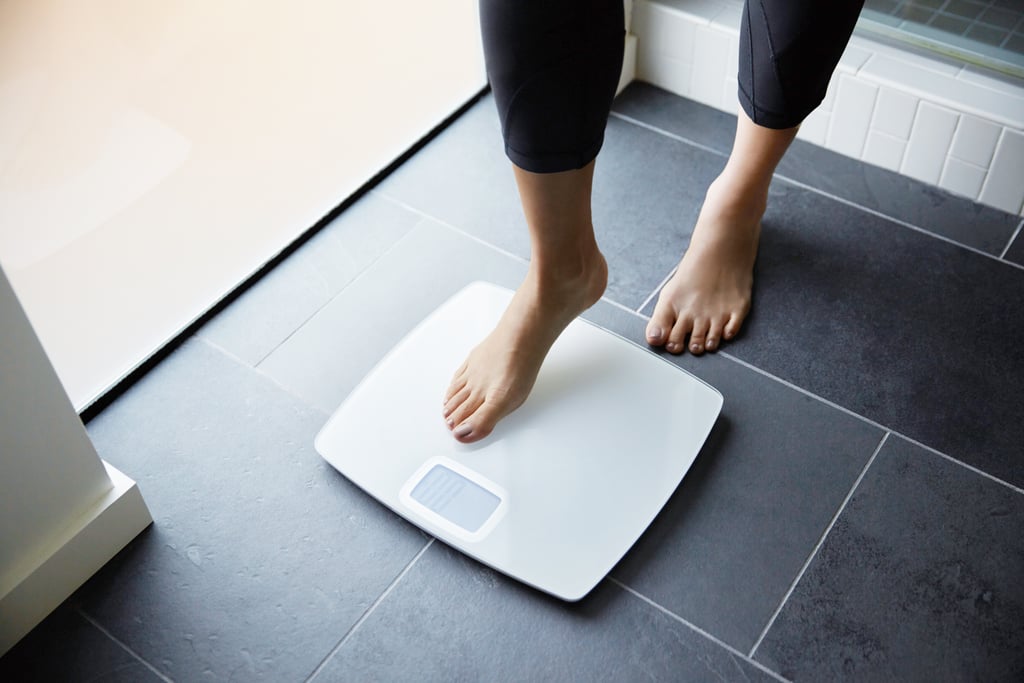This time of year, we're flooded with gimmicks and so-called "revolutionary" ways on how to finally lose weight [1] and keep it off for good: cleanses, detoxes, bootcamp classes, weird spa treatments, food delivery services, and every fitness app ever promise to help you shed those unwanted pounds and finally get in the best shape of your life [2].
And while some of these strategies may help the numbers on the scales go down, odds are it will only be temporary [3]. In order to change your habits [4] for good and make lasting weight-loss progress, you need to put in some time, effort, and consistency. We tapped some of our best weight-loss experts, who revealed how you can actually lose weight and keep it off. It's true what they say: slow and steady wins the race.
So if you're looking to lose 30 pounds in a month, this list isn't for you. But if you do want to finally hit your goal weight and never have "lose weight" as a resolution again, keep reading.
Expect to Lose 1-2 Pounds a Week
Although everyone's body is different, in general, people can expect to lose one to two pounds a week [5] if they are doing so in a healthy manner. "Over the course of two months or eight weeks, a healthy weight-loss goal is eight to 16 pounds," Jim White, RDN, ACSM-certified trainer and owner of Jim White Fitness and Nutrition Studios [6], told POPSUGAR.
Losing weight at this rate ensures that you'll keep it off for the long term. If you have more weight to lose (50 or more pounds), you may lose more weight in the first few weeks, but in general, about a pound or two a week is a healthy target.
Eat in a Healthy Calorie Deficit
Ultimately, losing weight is all about calories in, calories out. In order to lose weight, you have to burn more calories than you take in. "You have to create a deficit of 3,500 calories to lose one pound [7]," Jim said. "This can be done by burning extra calories through exercise or reducing your intake of calories, but the best way is to use a combination of both methods. This ensures that you're giving your body enough nutrients during periods of weight loss."
However, eating in a 3,500-calorie deficit doesn't guarantee an exact weight loss of one pound. There are a lot of other factors that impact how your body loses weight, including stress, sleep [8], and hormones.
Although you should eat in a calorie deficit, Jim doesn't recommend anyone eat fewer than 1,200 calories a day. And since calorie needs are highly individual from person to person, he recommends meeting with a registered dietitian if you can to assess your needs and your goals. If that's not a possibility, you can use this formula [9] to calculate your ideal calorie deficit for weight loss.
To see if you're eating your daily target of calories, track your food [10] in a food journal or with a tracking app such as MyFitnessPal or your FitBit app.
Eat, Don't Drink, Your Calories
"Eat your calories, don't drink them," registered dietitian Katherine Brooking, MS, told POPSUGAR. "Because the body doesn't compensate for calories from liquids as well as it does from foods you chew, make a mental note of how many calorie-laden drinks you're downing. Replace just one glass of coke or juice with water or a calorie-free beverage [11] and you'll be several pounds lighter a year from now."
Eat Nutrient-Dense Foods
It's not just the quantity of calories you take in but also the quality. Jim explained that not all food is created equal. "Especially when restricting calories, it's important to choose foods that are packed with nutrients," he said. He recommends following the MyPlate guidelines [12] for incorporating each food group at every meal:
- Fruits and vegetables: fill half of your plate with different colours and varieties of produce.
- Protein: choose lean options like chicken, fish, and legumes.
- Starch: choose whole grains like brown rice or whole-wheat bread.
- Dairy: include one serving of low-fat or skim milk, cheese, or yoghurt.
This Clean Eating Plan [13] is a great source for healthy recipes.
Do Cardio and Strength Training
According to Jim, it's important to incorporate both cardio and strength training [14] if you want to lose weight and keep it off for good. And while you probably know this already, the way he explains it totally changed the way we thought about working out for long-term weight loss.
"The reason for needing both cardio and resistance training in your exercise routine is the way your body burns calories long-term," he told us. "Running [15] is like a debit account (you would create a calorie deficit, but that deficit is a one-time transaction), whereas resistance training [16] is like getting a payout from an investment account (the calories you burn during your exercise continue even after your workout ends)."
So while cardio burns calories as you do it, resistance training (such as lifting weights, bodyweight moves, or using resistance bands) helps build lean muscle in your body, which will burn more calories at rest [17]. For weight loss, Jim recommends 300 minutes (five hours) of cardio a week and strength training at least two days a week.
Manage Stress
In times of stress, our bodies release cortisol, Dr. Charlie Seltzer [18], a physician board-certified in obesity medicine, told POPSUGAR. Cortisol is also known by its alter ego: the stress hormone. "By itself, cortisol does not cause weight gain," he explained. "It is a catabolic hormone that causes weight loss by breaking down muscle and fat." But that, unfortunately, doesn't mean that more stress equals weight loss. Cortisol is actually an appetite stimulant, Dr. Seltzer said, which explains why when you're stressed, you want to eat [19]. And you can have a harder time saying no to carb-y, fatty junk foods.
Have a Supportive Network and Environment
Eduardo Grunvald, MD, program director at UC San Diego's Weight Management Program [20], told POPSUGAR the biggest indicator of weight-loss success: having a supportive environment.
This support system could be from a weight-loss program, dietitian, health educator, or obesity medicine doctor or clinic. It's also important to have a supportive environment at home. If you make an effort to eat healthy and work out regularly but your spouse still keeps junk food in the house and never exercises, you're setting yourself up for failure. Make sure your friends, family, and partner are aware of your weight-loss goals, and strive to spend most of your time around people who are supportive.






